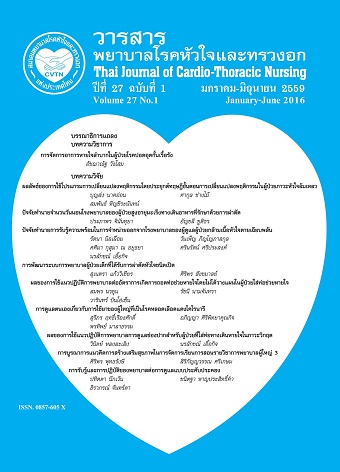การรับรู้และการปฏิบัติของพยาบาลต่อการดูแลแบบประคับประคอง
คำสำคัญ:
การรับรู้, การปฏิบัติ, การดูแลระยะสุดท้าย, การดูแลแบบประคับประคอง, perception, practice, end of life care, palliative careบทคัดย่อ
การวิจัยพรรณนาเชิงคุณภาพนี้มีวัตถุประสงค์ เพื่อศึกษาการรับรู้และการปฏิบัติของพยาบาลในการดูแลแบบประคับประคอง ผู้ให้ข้อมูลเป็นพยาบาลที่ปฏิบัติงานในโรงพยาบาลระดับตติยภูมิแห่งหนึ่งจำนวน 20 ราย เก็บรวบรวมข้อมูลด้วยการสัมภาษณ์เชิงลึกด้วยแบบสัมภาษณ์กึ่งโครงสร้าง และบันทึกเทป วิเคราะห์ข้อมูลโดยใช้สถิติ บรรยายและการวิเคราะห์เนื้อหา
ผลการศึกษาพบว่า ผู้ให้ข้อมูลให้ความหมายการดูแลแบบประคับประคองตามการรับรู้ 2 ลักษณะ คือ 1)การดูแลผู้ป่วยระยะสุดท้าย และ 2) การดูแลตั้งแต่เริ่มการวินิจฉัยจนถึงระยะสุดท้าย ส่วนการปฏิบัติการดูแลแบบประคับประคองมี 5 ด้าน ได้แก่ 1) ดูแลสุขอนามัยของร่างกาย 2) ดูแลด้านจิตใจเพื่อตอบสนองความต้องการของผู้ป่วย 3) ดูแลด้านจิตวิญญาณ เน้นการปฏิบัติตามพิธีกรรมทางศาสนา 4) ดูแลจัดการอาการ และ 5) ให้ข้อมูลการดำเนินโรค และภาวะสุขภาพ ส่วนในเรื่องปัจจัยส่งเสริมในการดูแลแบบประคับประคองมี 4 ปัจจัย ได้แก่ 1) สมรรถนะของพยาบาลที่ให้การดูแลแบบประคับประคอง 2) บุคลิกลักษณะของพยาบาลผู้ให้การดูแลแบบประคับประคอง 3) การสนับสนุนด้านความรู้และการอบรมการดูแลแบบประคับประคองอย่างเป็นระบบ และ 4) ประสบการณ์ในการดูแลแบบประคับประคอง ส่วนอุปสรรคในการดูแลแบบประคับประคองแบ่งเป็น 4 ด้าน ได้แก่ 1) พยาบาลมีสมรรถนะไม่เพียงพอในการดูแล 2) ขาดแคลนพยาบาลที่ให้การดูแลแบบประคับประคองและภาระงานมาก 3) การสื่อสารระหว่างทีมสุขภาพกับผู้ป่วยและญาติไม่มีประสิทธิภาพ และ 4) ขาดการสนับสนุนระบบการดูแลแบบประคับประคองเชิงนโยบาย
ผลการวิจัยครั้งนี้แสดงให้เห็นถึงการรับรู้และการปฏิบัติของพยาบาลในการดูแลผู้ป่วยแบบประคับประคอง ซึ่งจะเป็นข้อมูลพื้นฐานนำไปสร้างกลยุทธ์เพื่อพัฒนาสมรรถนะและการรับรู้ของพยาบาลในการดูแลผู้ป่วยแบบประคับประคองที่เหมาะสม ส่งผลต่อการพัฒนาการปฏิบัติการดูแลแบบประคับประคองอย่างมีคุณภาพและมีประสิทธิภาพต่อไป
Nurses’ perceptions and practice on palliative care
The aim of this qualitative descriptive study was to describe nurses’ perceptions and practice on palliative care. Twenty tertiary hospital nurses participated in the study. Data collected by in-depth interviews using a semi-structured interview and a tape recording. Data analyzed by using descriptive statistical and content analysis.
The results showed that participants’ perception of palliative care were two meanings. Firstly, palliative care starts at the end of life. Secondly, palliative care starts from the patients’ diagnostic to the end of life. The palliative care nursing practices had been described into five categories as: 1) providing general hygiene care, 2) responding to patients’ psychosocial and mental health needs, 3) providing spiritual care especially a religion practice, 4) providing symptoms management, and 5) giving information of health and disease progression. There were four facilitating factors on palliative care practices as: 1) nurses’ competencies in palliative care, 2) nurses’ characteristic of palliative care, 3) supporting of systemic education and training for palliative care, and 4) nurses’ experiences in palliative care. There were four barriers to perform effective palliative care as: 1) nurse’s inadequate competencies, 2) shortage of nurses in palliative care and their over workload, 3) ineffective communication between health care team and patients including their family, and 4) lack of palliative care support policy.
These results reflected the nurses’ perceptions and practice on palliative care. This result can be useful information for determining strategies that can improve appropriate nurses’ competency and perception of palliative care, which will lead to effectively and quality of care.
ดาวน์โหลด
รูปแบบการอ้างอิง
ฉบับ
ประเภทบทความ
สัญญาอนุญาต
บทความนี้ยังไม่เคยตีพิมพ์หรืออยู่ในระหว่างส่งไปตีพิมพ์ในวารสารอื่น ๆ มาก่อน และกองบรรณาธิการขอสงวนสิทธิ์ในการตรวจทาน และแก้ไขต้นฉบับตามเกณฑ์ของวารสาร ในกรณีที่เรื่องของท่านได้ได้รับการตีพิมพ์ในวารสารฉบับนี้ถือว่าเป็น ลิขสิทธิ์ของวารสารพยาบาลโรคหัวใจและทรวงอก






